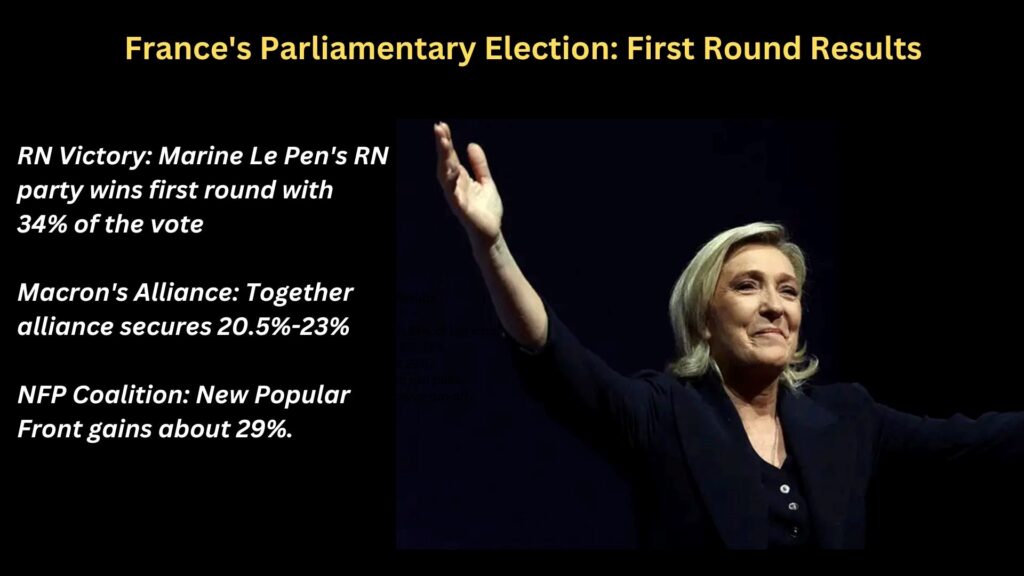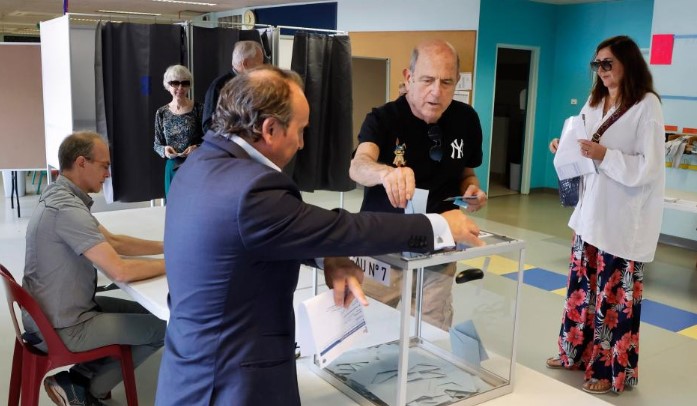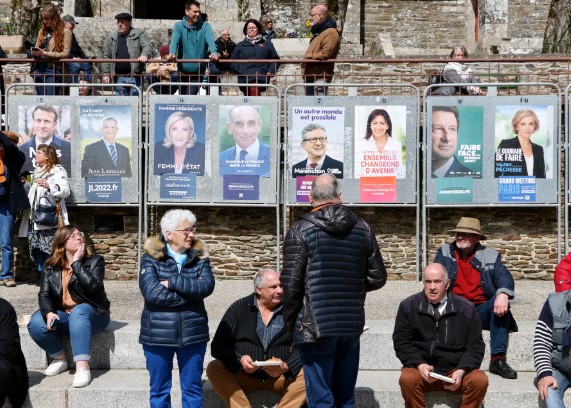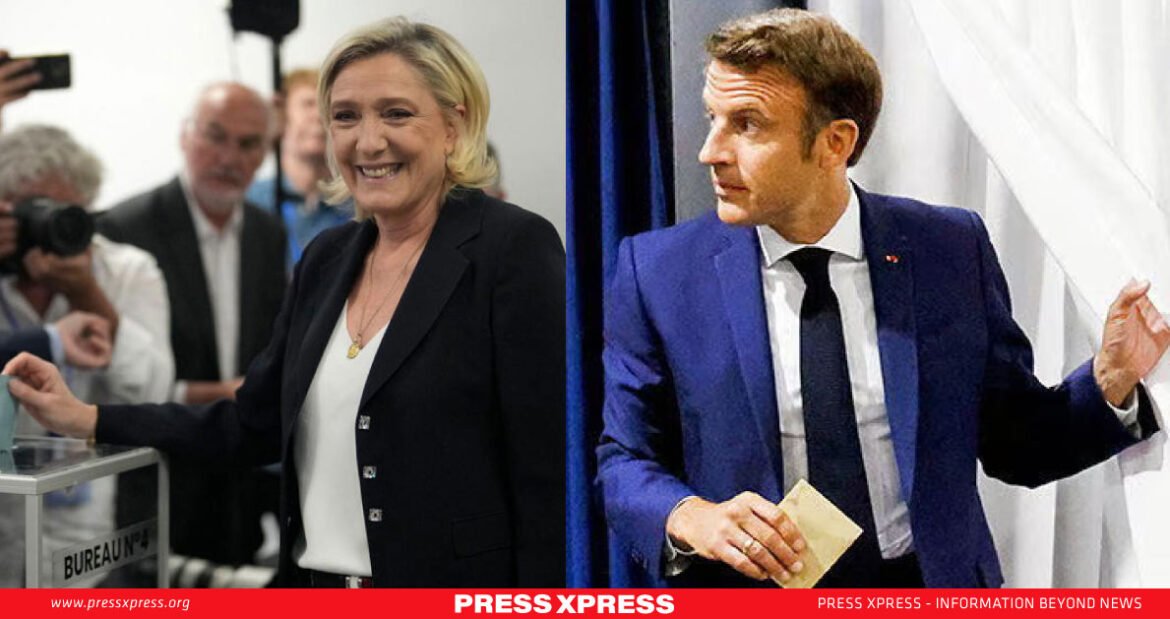Key Features:
- France holds first round of parliamentary election
- Anti-immigrant, Eurosceptic RN emerges ahead
- Leftist bloc in second, Macron’s centrists in third
- The second round will take place on July 7
In a dramatic turn, Marine Le Pen’s far-right National Rally (RN) party has made history by clinching France’s 1st round election, as indicated by exit polls. However, the outcome hinges on days of intense negotiation leading up to the decisive run-off next week.
You Can Also Read: France faces political paralysis as far-right win predicted in elections
Exit polls from Ipsos, Ifop, OpinionWay, and Elabe reveal that the RN secured approximately 34% of the vote, dealing a significant blow to President Emmanuel Macron, who called for the snap election following a previous defeat by the RN in European Parliament elections. Macron’s Together alliance trailed with 20.5%-23%, while the New Popular Front (NFP), a hastily formed left-wing coalition, garnered about 29% of the vote.

How does it function?
The second round of France’s parliamentary election on July 7 is pivotal, following Marine Le Pen’s far-right National Rally (RN) party’s strong showing in the initial round. This election process for the 577 seats in the National Assembly operates in two rounds. In constituencies where no candidate secures an outright majority in the first round, the top two candidates, along with any candidate receiving more than 12.5% of registered voters, advance to a runoff.

With a high turnout indicating potential three-way run-offs in about 300 constituencies, the RN stands to benefit theoretically. To counter this, France’s center-right and center-left factions traditionally implement a ‘republican front’. Here, the third-place candidate voluntarily withdraws from the race, encouraging supporters to consolidate behind the second-place candidate to block the RN’s ascendancy.
France Parliamentary Election – 2nd Round
Date: July 7, 2024
- Election Process: 2 rounds for 577 seats
- First Round Outcome: RN leads; Macron’s alliance and NFP follow
- Runoff Conditions: Top 2 candidates and those with >12.5% voters
- Potential Challenges: 3-way run-offs in 300 constituencies
- ‘Republican Front’: Center-right and center-left unite to block RN by backing 2nd-place candidate
Candidates have until Tuesday evening to decide whether to continue or withdraw from the run-off, which will determine the final occupant of each constituency’s seat. The outcome of these strategic decisions will significantly influence the composition and dynamics of France’s National Assembly in the coming legislative term.
Political Landscape and Challenges Ahead
The initial exit poll results were met with jubilation by supporters of Marine Le Pen, although they do not provide definitive clarity on whether the anti-immigrant, Eurosceptic RN can forge a coalition government with Macron’s pro-EU stance after the run-off. Long positioned as a pariah in French politics, the RN has endeavored to reform its image tarnished by allegations of racism and antisemitism, resonating with voters disillusioned by Macron’s policies, economic pressures, and immigration concerns. Supporters in Henin-Beaumont celebrated fervently, underscoring a growing call for change.
The Republican Front and Strategic Alliances
Expecting multiple three-way run-offs due to heightened voter turnout, traditional center-right and center-left factions contemplate activating a ‘republican front’. This strategy urges third-placed candidates to withdraw from the race, consolidating support behind the runner-up to obstruct the RN’s ascent. However, the efficacy of this tactic remains uncertain amidst evolving political dynamics and public skepticism towards establishment directives.
Scenarios and Market Reactions
As political maneuvering intensifies, Macron has called for unity behind candidates championing democratic values, explicitly excluding both the RN and the hard-left France Unbowed party. Jordan Bardella, the 28-year-old president of RN, expressed readiness to assume the prime ministership in the event of an absolute majority for his party, ruling out minority governance scenarios.
Public Sentiment and Economic Impact
In Paris’s Republique square, a somber mood prevailed as several thousand anti-RN protesters gathered, reflecting sentiments of disgust, sadness, and fear over the RN’s electoral gains. Market reactions were subdued, with early trading showing a marginal increase in the euro, indicating relief over a largely anticipated outcome. Analysts caution that final results, including seat projections and official voter turnout figures, remain pending, highlighting the inherent unpredictability of post-first-round electoral dynamics.

Speculation in French Politics
In recent years, the far-right’s influence in French politics has been steadily growing. Led by Bardella, the RN party, represented by Marine Le Pen in parliament, has significantly increased its voter support despite her unsuccessful presidential bids. Projections now suggest RN could emerge as France’s largest party, though likely without an outright majority.
Capitalizing on widespread voter dissatisfaction with economic conditions and immigration policies, RN’s rise could lead to a centrist and far-right coalition governing together—a scenario where Bardella and Le Pen would wield significant influence in parliament.
Looking ahead to the 2027 elections, maintaining their current momentum is crucial for RN. While Macron retains the authority to appoint the prime minister as per the Constitution, aligning with the Assembly’s majority poses a challenge, potentially favoring Bardella for the role.
Bardella has expressed his reluctance to serve as a subordinate to the president, emphasizing his party’s pursuit of an absolute majority.
As France awaits the results of the July 7 runoff, the prospect of cohabitation between centrist and far-right factions remains uncertain and contentious. The outcome will profoundly shape Macron’s tenure and the country’s political future, hanging the formation of the new government in the balance until then.
Conclusion
As France awaits the results of the July 7 runoff, the prospect of cohabitation between centrist and far-right factions remains uncertain and contentious. The outcome will profoundly shape Macron’s tenure and the country’s political future, with broader implications for European politics amid a climate of profound change and uncertainty.
This pivotal moment in French politics underscores a nation grappling with political polarization and shifting allegiances. The final verdict will not only determine France’s immediate political landscape but also its role and influence within the European Union and on the global stage.


